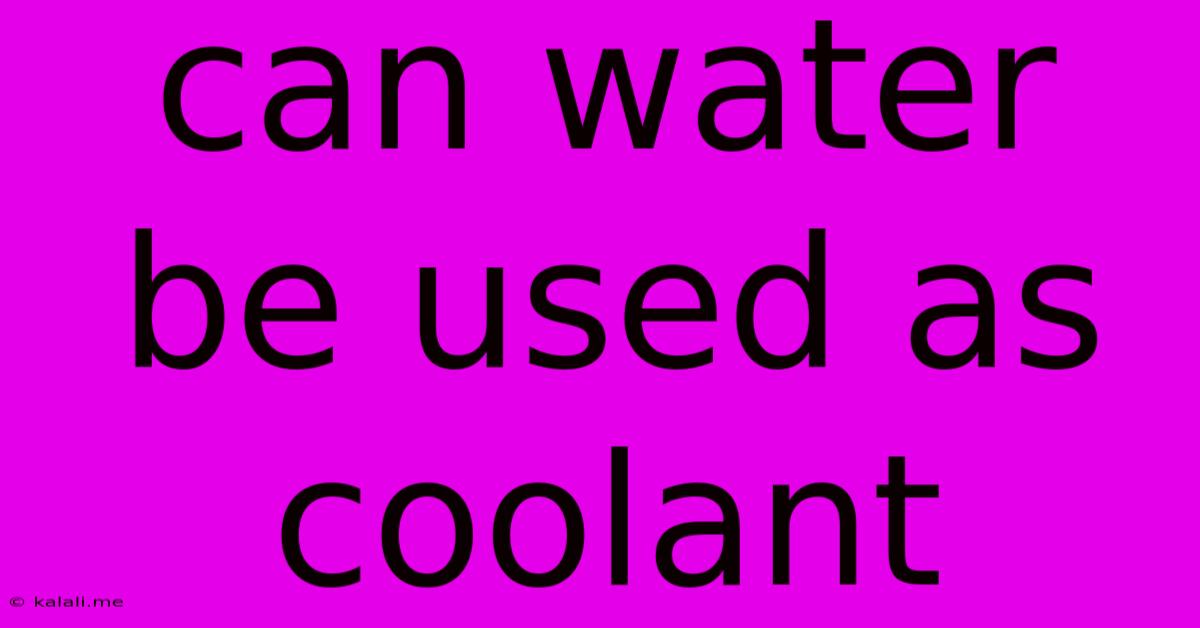Can Water Be Used As Coolant
Kalali
May 20, 2025 · 3 min read

Table of Contents
Can Water Be Used as a Coolant? A Comprehensive Guide
Water's role as a coolant is a question frequently asked, and the answer is a nuanced "yes, but..." This article delves into the effectiveness of water as a coolant, its limitations, and suitable applications, exploring its properties and comparing it to other coolants. We'll cover everything you need to know to determine if water is the right coolant for your specific needs.
Water's high specific heat capacity – its ability to absorb heat before its own temperature rises significantly – makes it a naturally effective coolant. This property, coupled with its readily available and relatively inexpensive nature, makes it a popular choice for many cooling applications. However, its suitability depends on several crucial factors.
Advantages of Using Water as a Coolant
- High Specific Heat Capacity: As mentioned, water excels at absorbing large amounts of heat without a drastic temperature increase, making it efficient at transferring heat away from the heat source.
- Abundant and Affordable: Water's accessibility and low cost are significant advantages, especially for large-scale applications.
- Non-Toxic (Generally): Pure water is non-toxic, making it a safer option compared to some chemical coolants, particularly in applications where leakage is a concern.
- Easy to Handle and Transport: Water is easily pumped and circulated, simplifying system design and maintenance.
Disadvantages and Limitations of Water as a Coolant
- Freezing Point: Water's freezing point at 0°C (32°F) poses a significant limitation. In environments where temperatures drop below freezing, water-based coolant systems require antifreeze additives such as ethylene glycol or propylene glycol to prevent freezing and potential damage to the system. These additives, however, introduce their own set of considerations, including toxicity and environmental impact.
- Boiling Point: Similarly, water's relatively low boiling point (100°C or 212°F) limits its use in high-temperature applications. At high temperatures, water can vaporize, leading to reduced cooling efficiency and potential system damage. Pressurized systems can help mitigate this issue, but add complexity and cost.
- Corrosion: Water can be corrosive, especially to certain metals. This necessitates the use of corrosion inhibitors or materials resistant to water corrosion in the cooling system. The type of metal used in the cooling system plays a significant role here. Proper material selection is critical.
- Scaling and Fouling: Minerals dissolved in water can deposit on heat transfer surfaces, reducing cooling efficiency. This scaling requires regular maintenance and cleaning. Water treatment is often necessary to minimize this issue.
- Biofouling: Water can support microbial growth, leading to biofouling in the cooling system, which can also impede efficiency. Biocides or other anti-fouling measures may be required.
When is Water a Suitable Coolant?
Water is an excellent coolant choice for:
- Lower-Temperature Applications: Systems operating below its boiling point and above its freezing point (with antifreeze where necessary). This includes many automotive engine cooling systems, industrial processes operating within a moderate temperature range, and some HVAC systems.
- Applications Where Cost is a Primary Concern: Water's affordability makes it ideal for large-scale applications where the cost of coolant is a significant factor.
- Applications Prioritizing Safety: Its non-toxicity makes it preferable in certain situations where chemical coolants pose a higher risk.
Alternatives to Water Coolants
Other coolants, such as ethylene glycol, propylene glycol, and various oils, offer advantages in high-temperature or low-temperature environments, providing better performance where water falls short. However, these alternatives often come with trade-offs related to cost, toxicity, and environmental impact. The choice of coolant depends greatly on the specific application and its requirements.
Conclusion
Water's effectiveness as a coolant hinges on the operating temperature range and the specific system design. While its high specific heat capacity and low cost are attractive, its limitations regarding freezing and boiling points, corrosion, and scaling require careful consideration. A thorough understanding of these factors is crucial in determining the suitability of water as a coolant for any given application. Always assess the specific needs of your cooling system before selecting a coolant.
Latest Posts
Latest Posts
-
Point At Which Water Vapor Condenses
May 20, 2025
-
Hot Water And Cold Water Mix
May 20, 2025
-
Natalie Dormer Game Of Thrones Nude
May 20, 2025
-
Why Does Frodo Leave At The End
May 20, 2025
-
Hole Is Too Big For Screw
May 20, 2025
Related Post
Thank you for visiting our website which covers about Can Water Be Used As Coolant . We hope the information provided has been useful to you. Feel free to contact us if you have any questions or need further assistance. See you next time and don't miss to bookmark.